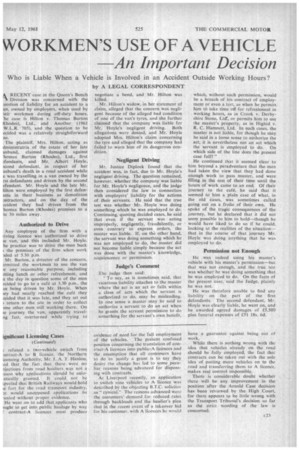WORKMEN'S USE OF A VEHICLE An Important Decision
Page 59

If you've noticed an error in this article please click here to report it so we can fix it.
Who is Liable When a Vehicle is Involved in an Accident Outside Working Hours?
by A LEGAL CORRESPONDENT k RECENT ease in the Queen's Bench -1 Division was concerned with the uestion of liability for an_ accident to a an, owned by employers, when used by eeir workmen during off-duty hours. 'he case is Hilton v. Thomas Burton R.hodes), Ltd., and Another (1961 W.L.R. 705), and the question to be ecided was a relatively straightforward ne.
The plaintiff, Mrs. Hilton, acting as dministratrix of the estate of her late usband, claimed damages against 'homes Burton (Rhodes), Ltd., first :fendants, and Mr. Albert Hoyle, .scond defendant, in respect of her usband's death in a road accident while e was travelling in a van owned by the rst defendants and driven by the second efendant. Mr. Hoyle and the late Mr. Mon were employed by the first defentilts in their business as demolition 3ntractors, and on the day of the scident they had driven from the homas Burton (Rhodes) premises to a te 30 miles away.
Authorized to Drive
Any employee of the firm with a riving licence was authorized to drive le van, and this included Mr. Hoyle. he practice was to drive the men back L the premises of the firm when work Ided at 5.30 p.m.
Mr. Burton, a director of the concern. srmitted the workmen to use the van Lr• any reasonable purpose, including :tting lunch or other refreshment, and a the day in question some of the men scided to go to a café at 3.30 p.m., the in being driven by Mr. Hoyle. When Ley had nearly reached the café they seided that it was late, and they set out L return to the site in order to collect Lme other men still working there. On le journey the van, apparently travelng fast. overturned while trying to negotiate a bend, and ' Mr. Hilton was kilted.
Mr. Hilton's widow, in her statement of claim, alleged that the concern was negligent because of the alleged bad condition of one of the van's tyres, and she further claimed that the company was liable for Mr. Hoyle's negligent driving. Both allegations were denied, and Mr. Hoyle adopted Mrs. Hilton's claim concerning the tyre and alleged that the company had failed to warn him of its dangerous condition.
Negligent Driving Mr. Justice Diplock found that the accident was, in fact, due to Mr. Hoyle's negligent driving. The question remained, however, whether the company was liable for Mr. Hoyle's negligence, and the judge then considered the law in connection with employers' liability for the actions of their servants. He said that the true test was whether • Mr. Hoyle was doing something which he was employed to do. Continuing, quoting decided cases, he said that even if the servant was acting improperly, negligently, fraudulently, or even contrary to express orders, the master was liable, If, on the other hand, the servant was doing something which he was not employed to do, the master did not become liable simply because the act was done with the master's knowledge, acquiescence or permission.
Judge's Comment The judge then said: "To say, as is sometimes said, that vicarious liability attaches to the master where the act is an act or falls within a class of acts which the servant is authorized to do, may be misleading. in one sense a master may be said to authorize a servant to do an act when he grants the servant permission to do something for the servant's own benefit, which, without such permission, would be a breach of his contract of employment or even a tort, as when he permits hint to take time off for refreshment in working hours, as in Crook v. Derbyshire Stone, Ltd., or permits him to use the master's property, as in Higbid v. R. C. Hamnett, Ltd. In such cases, the master is not liable, for though he may be said in a loose sense to authorize the act, it is nevertheless not an act which the servant is employed to do. On which side of the line does the present case fall?"
He continued that it seemed clear to him beyond a peradventure that the men had taken the view that they had done enough work to pass muster, and were filling in the rest of their time until the hours of work came to an end. Of their journey to the café, he said that it seemed to him a plain case of what, in the old cases, was sometimes called going out on a frolic of their own. He spoke of the tragic consequences of the journey, but he declared that it did not seem possible to him to hold—though he would have liked to do so if he could. looking at the realities of the situation— that in the course of that journey Mr. Hoyle was doing anything that he was employed to do.
Pemilssion not Enough He was indeed using his master's vehicle with his master's permission—but that was not enough, and the true test was whether he was doing something that he was employed to do. On the facts of the present case, said the Judge, plainly he was not.
He was therefore unable to find any liability on the part of the first defendants. The second defendant, Mr. Hoyle was clearly liable, he went on, and he awarded agreed damages of £5,500 plus funeral expenses of £51 18s. 6d.
























































































































